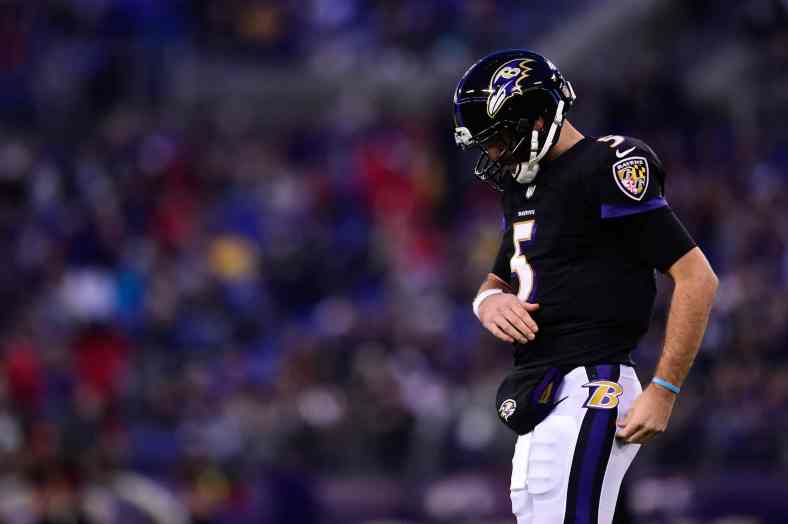
Team building around the NFL is defined by how many long-term starters you can acquire in a given draft. These prospects might not start out of the gate. Instead, it’s primarily about projecting into the future.
Though, teams do draft for immediate need. If they can find value at that position, it’s even better. It might not be the overriding philosophy for front offices around the league. But it happens more often than teams might want to admit.
It’s in this that we check in on 15 NFL veterans who could surprisingly be benched for rookies this coming season. That includes multiple quarterbacks and a few running backs who are already looking over their shoulders.
Shon Coleman, offensive tackle, Cleveland Browns
Cleveland surprised many people by selecting offensive lineman Austin Corbett with the first pick in the second round of this year’s draft. A guard at Nevada, Corbett will kick outside for a Browns team that needs help at tackle after the retirement of future Hall of Fame left tackle Joe Thomas. At least initially, it won’t be at left tackle where the Browns exhausted a five-year, $36.5 million deal on Chris Hubbard. If Corbett does impress, this means he’ll likely start his career at right tackle. That’s where Coleman, a former third-round pick, comes into play. He started all 16 games last season, only to rank outside of the top-50 tackles in the NFL, according to Pro Football Focus metrics.
Torrey Smith, wide receiver, Carolina Panthers
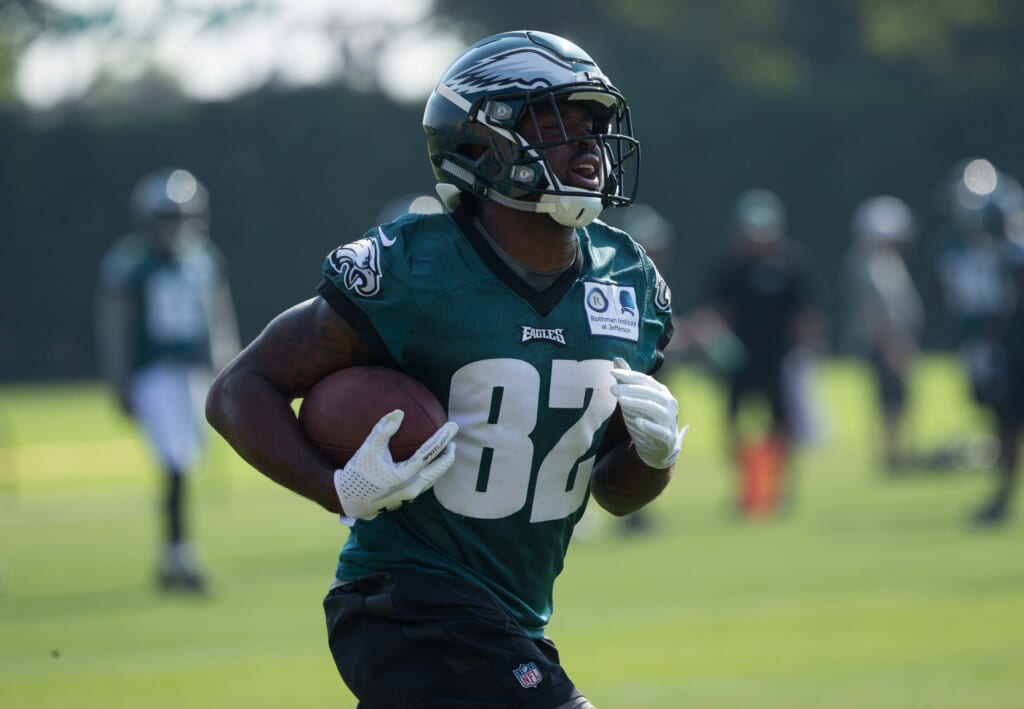
Carolina didn’t spend a first-round pick on D.J. Moore for him to sit on the bench as a rookie. Just ask Cam Newton about the necessity to get more consistent receivers on the outside. Obviously, by adding Smith in a trade with Philadelphia, the Panthers began that process. But here’s a guy that caught less than 54 percent of his 67 targets in Philadelphia last season. He’s no longer a starting receiver in the NFL. That much is clear. Instead, we fully expect Smith to replaced on the depth chart by a player in Moore who the Panthers could very well decide to line up outside initially. He might only be 6-foot, but that’s misleading. Moore has the catch radius to make a name for himself as an outside receiver opposite Devin Funchess. It just makes too much sense.
Samaje Perine and Rob Kelley, running backs, Washington Redskins
These two averaged a combined 3.2 yards per attempt last season. It led to a lack of balance for then quarterback Kirk Cousins. Heading into the 2018 season, Washington can’t afford to make that same mistake. New signal caller Alex Smith has always relied on a dominant running game, starting in San Francisco and over the past five seasons in Kansas City. Rookie second-round pick Derrius Guice is the only player on Washington’s roster that provides this type of upside. He would have been a top-20 pick if it weren’t for some ridiculous character concerns that were floated out there by NFL teams heading into the draft. At 5-foot-11 and 218 pounds, Guice has the size to be a three-down back. Look for him to take over the starting role out of the gate as a rookie.
Malcolm Smith, linebacker, San Francisco 49ers
All of this really depends on the Reuben Foster legal situation. Even if he is cleared of wrongdoing in the court system, the NFL could still suspend the former first-round pick. But that wouldn’t come without a protracted legal battle itself. Assuming Foster is on the field to start the 2018 season, look for rookie third-round pick Fred Warner to challenge Smith for the starting SAM linebacker position. At 6-foot-4 and 230 pounds, Warner is similar to the likes of Telvin Smith and Deion Jones as a more athletic backer. He offers considerably more upside than Smith from a pass-coverage standpoint. After signing a five-year, $25.6 million contract last March, Smith suffered a season-ending pectoral injury in camp. Look for him to potentially lose his job as early as training camp.
Abry Jones, defensive tackle, Jacksonville Jaguars
After putting up a solid season in 2016, Jones took a step back for Jacksonville last year. In fact, he’s considered the one weak link in what should be the most dominating front seven in the NFL next season. That’s why Jacksonville exhausted a first-round pick on former Florida defensvie tackle Taven Bryan. He’s a massive 6-foot-5, 291-pound mountain of a man and provides a ton more talent from a pass-rush perspective than Jones. It’s the perfect fit for both Bryan and what is a Super Bowl contending Jaguars squad.
Josh McCown, quarterback, New York Jets
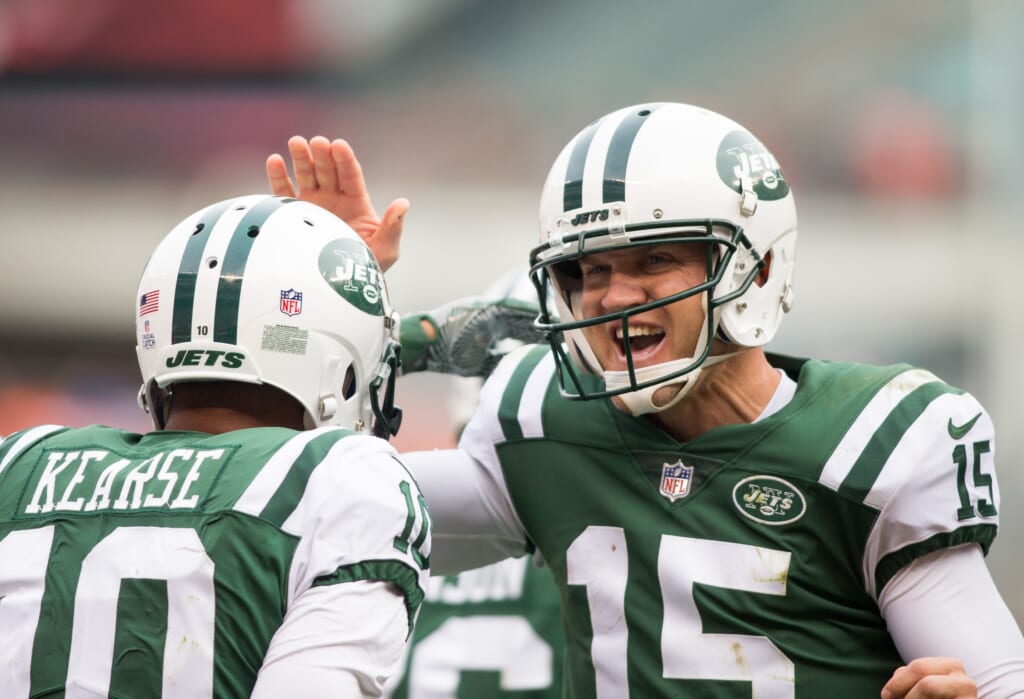
It seems to be a consensus that Sam Darnold is the most pro-ready quarterback of the 2018 NFL Draft class. A two-year starter at USC, the No. 3 pick averaged just 11 interceptions per season for the Trojans. Decision making might be an issue, but Darnold’s accuracy should enable him to make an immediate impact. Should McCown struggle out of the gate after re-signing with the Jets on a small one-year, $10 million contract, we can easily envision the Jets switching to their future franchise quarterback. That idea will be ramped up even more within the not-so-friendly confines of New York’s media market should the Jets themselves prove to be out of playoff contention. We fully expect that to be the case.
Brent Grimes, cornerback, Tampa Bay Buccaneers
Despite ranking in the bottom third of starting cornerbacks around the NFL, Tampa Bay re-signed Grimes to a one-year, $7 million deal this offseason. In no way does that type of contract guarantee the 34-year-old cornerback a starting job this coming season. That’s only magnified by the fact that Tampa Bay exhausted second-round picks on cornerbacks M.J. Stewart and Carlton Davis. Both are seen as outside cornerbacks with former first-round pick Vernon Hargreaves now being relegated to slot duty. Grimes himself has never really played in the slot. Should both of these rookies impress during camp, look for them to get some early play. At that point, one could easily replace an aging Grimes as a starter.
Carlos Hyde, running back, Cleveland Browns
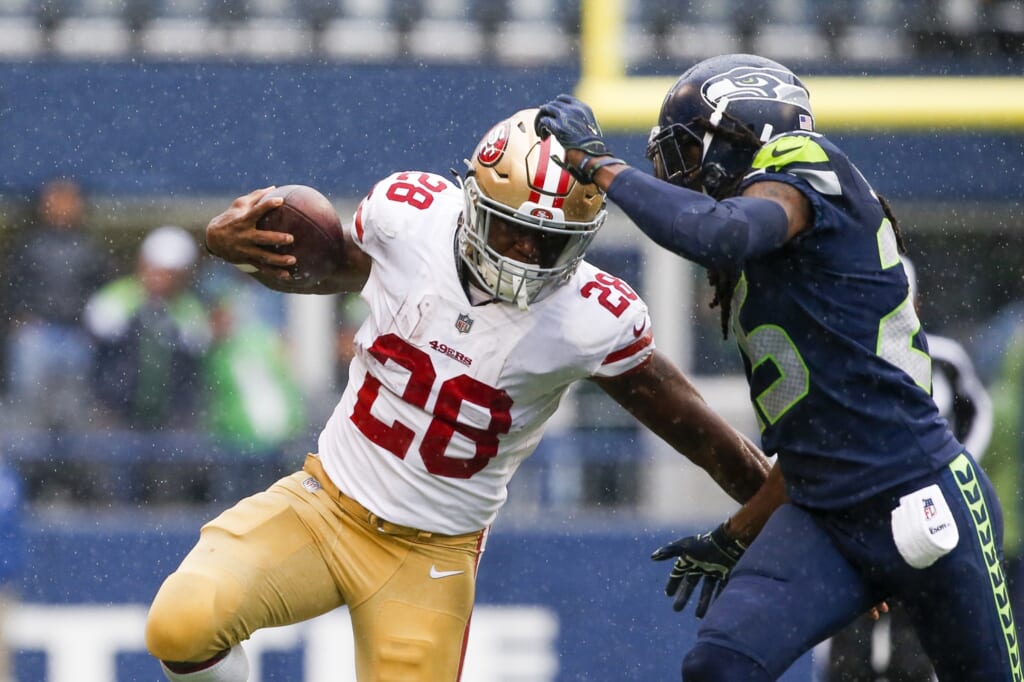
Having signed Hyde to a three-year, $15.3 million deal back in March, most thought the former San Francisco 49ers lead back would start throughout the duration of his deal. That’s until Cleveland exhausted a second-round pick on running back Nick Chubb. At 5-foot-11 and 227 pounds, Chubb has the frame to be a three-down back. And unlike Duke Johnson, he’s not seen as a third-down or change-of-pace running back. In fact, Chubb put up a combined 447 rush attempts in his final two seasons at Georgia. Despite upgrading their talent level on offense, this unit is still among the 10 least-talented in the NFL. Simply put, the Browns can’t afford to watch talent waste away on the bench. Having averaged less than four yards per attempt last season, any struggles from Hyde will likely lead to Cleveland turning to its talented rookie.
Mohamed Sanu, wide receiver, Atlanta Falcons
We expect rookie first-round pick Calvin Ridley to be utilized in the slot more often early in his career. In no way does this mean the 6-foot-1 pass catcher won’t challenge for snaps outside when the Falcons go two running backs with Devonta Freeman and Tevin Coleman. This is where Sanu’s role could be limited in 2018. Ridley has the best sets of hands in this year’s draft class and is already a pro-ready route runner. It’s actually a thing of art to watch. For his part, Sanu has never reached the 800-yard plateau in what hasn’t necessarily been a noteworthy career. The idea of teaming Ridley up opposite Julio Jones has to be extremely appealing to head coach Dan Quinn and Co.
Bradley Sowell, guard, Chicago Bears
Chicago’s first two picks in the 2018 NFL Draft were absolute steals. The latter of whom, offensive ineman James Daniels, projects to being an All-Pro center at the next level. Though, about half of the NFL viewed him more as a guard leading up to the draft. That’s where he’ll slot in under first-year Bears head coach Matt Nagy. Given that Daniels was a top-40 pick, there’s no reason to believe he won’t start out of the gate, building a strong guard foundation with Kyle Long. If so, a veteran in that of Bradley Sowell will likely find himself relegated to bench duties after it looked like he might ultimately start following the departure of Josh Sitton in free agency. It’s a massive upgrade for the Bears, one that should pay dividends for years to come.
Ameer Abdullah, running back, Detroit Lions
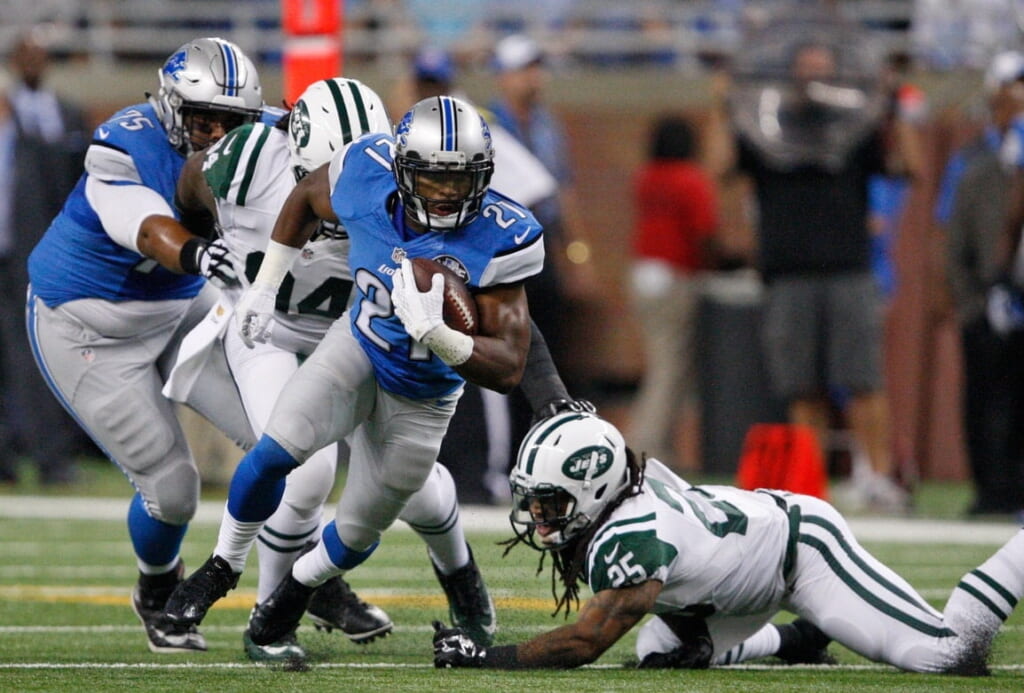
Abdullah is already unhappy about his role on the Lions’ offense. Sadly for him, that’s going to be taken to a whole new level after Detroit signed veteran LeGarrette Blount in free agency and added a talented Kerryon Johnson in the second round of this year’s draft. As to where Blount will likely see short-yardage duties, Johnson should be a near three-down back out of the gate. He stands at 5-foot-11 and weighs 206 pounds. That’s on the smaller end, but the Auburn product proved himself to be much stronger than his frame would suggest in dominating elite SEC competition to the tune of over 2,600 total yards and 31 touchdowns in his final two seasons with the Tigers. For his part, Abdullah failed to put up as much as 600 rushing yards in any of his first three NFL seasons. He’ll be riding the pine a lot this year should the Lions even decide to keep the veteran.
Kevin King, cornerback, Green Bay Packers
One really has to wonder if King is more of a safety at the NFL level. A second-round pick last year, the 6-foot-3 former Washington standout struggled to turn his eye-opening athleticism and frame into success as a rookie. In the nine games that King did play, he was one of the primary reasons Green Bay’s pass defense graded out in the bottom 10 of the NFL and yielded an absurd 102.0 quarterback rating. There’s no real reason to believe that Jaire Alexander and Josh Jackson, Green Bay’s first and second-round picks respectively, can’t surpass King on the depth chart immediately. If so, Green Bay might be best served moving him to strong safety with fellow 2017 draft pick Josh Jones transitioning from that position to linebacker.
Trent Brown, offensive tackle, New England Patriots
Is it possible Brown loses his starting job before ever stepping into that role during the regular season? Recently acquired from the San Francisco 49ers, Brown has performed at a near Pro Bowl level over the past two seasons. But injury and conditioning issues surprisingly ended his tenure in San Francisco. Should these problems creep back up in New England, it would not be a shock to see rookie first-round pick Isaiah Wynn start at left tackle out of the gate. A right tackle during his time with the 49ers, one might think Brown would seamlessly transition to that side of the line with Wynn replacing the departed Nate Solder as Tom Brady’s blindside protector. That’s until we realize both LaAdrian Waddle and Marcus Cannon have proven more than capable of handling starting right tackle duties in New England.
Tyrod Taylor, quarterback, Buffalo Bills
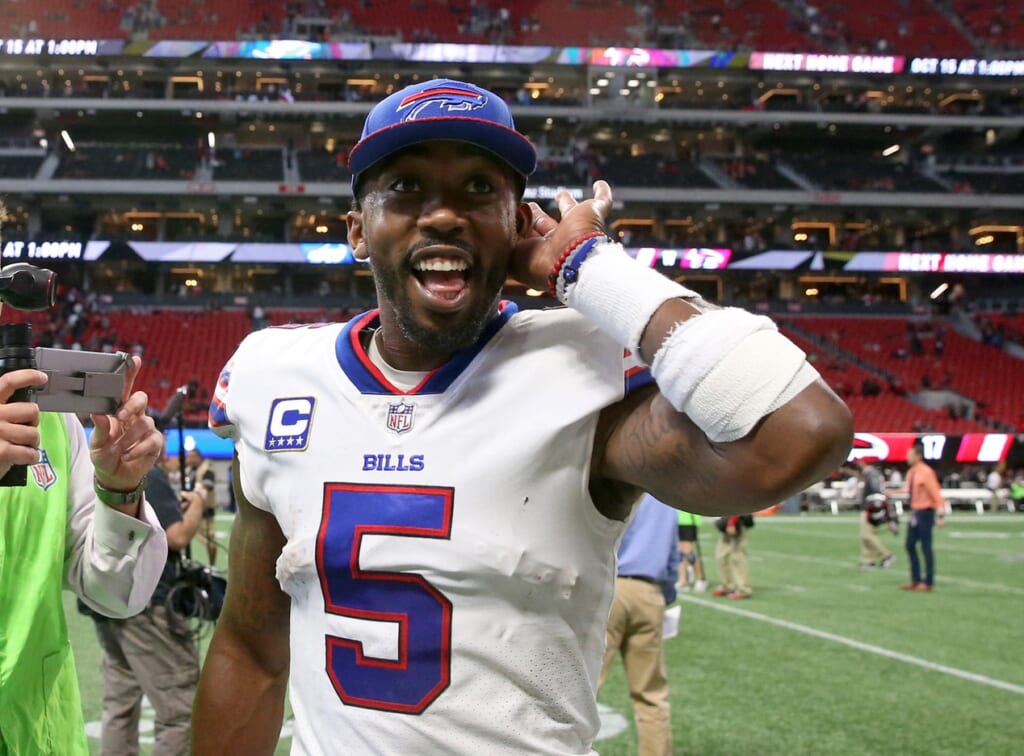
Browns head coach Hue Jackson has made it clear that Taylor is the team’s starting quarterback after it selected reigning Heisman winner Baker Mayfield No. 1 overall in last month’s draft. In fact, Jackson just recently noted that Mayfield would have to do something that “blows me away and blows the organization away” to earn the starting gig. It makes sense. After posting a 1-31 record in his first two seasons, Jackson is on the hot seat. He needs to see massive improvements when it comes to the win column this coming season. Relying on a rookie to do that would be foolish. Then again, Mayfield was the No. 1 overall pick. Should Taylor and the Browns struggle out of the gate, there might be organization-wide pressure for Jackson to bite the bullet and play Mayfield.
Joe Flacco, quarterback, Baltimore Ravens
Picture it. Flacco continues to act as one of the worst starting quarterbacks in the NFL like he has over the past several years. Meanwhile, former Heisman winner and first-round pick Lamar Jackson dazzles in practice. What would stop the Ravens from making that switch? Certainly, Flacco’s contract plays a role in this. But Baltimore simply can’t sit back and watch Flacco continue to struggle without doing anything. The team is in no way a Super Bowl contender. It has to look to the future. It’s in this that we would not be shocked if Baltimore pulled the plug on the Flacco era this coming season. How many more 18-touchdown, 13-interception seasons can the Ravens take?